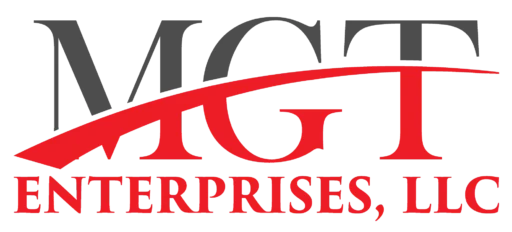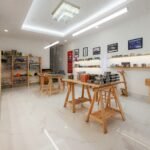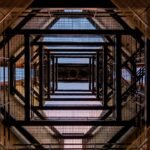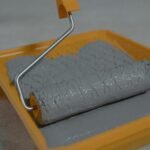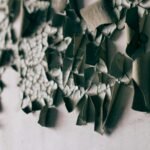Moisture and humidity can have a major influence on your ceiling. Not only do they cause it to sag and grow mold, but they also compromise the acoustics of the area. Because of these issues, there has been a high demand for moisture resistant ceiling tiles being installed in spaces like kitchens, bathrooms, natatoriums, healthcare environments, and coastal buildings where these conditions push materials to their limits.
To negate these issues, solutions like stone wool, mineral fiber that uses humidity additives, and hygiene-rated glass wool have now become the go-to solution for most households as well as businesses, as they offer both durability and acoustic comfort.
In this guide, we will walk through practical selection criteria and highlight the top-performing acoustic ceiling tiles for humid areas.
What “Moisture-Resistant” Really Means
When thinking of moisture resistant ceiling tiles, the term “resistant” doesn’t mean it is fully waterproof, but rather that it refers to its ability to withstand RH (high relative humidity).
Typically, these tiles are rated between 95%-100%, which helps them maintain their structural integrity. Likewise, some of these products are also tested for temperature tolerance (usually up to 40 °C). This testing procedure makes sure that these tiles don’t warp, sag, or weaken in demanding spaces like kitchens, bathrooms, or coastal buildings.
Moreover, tiles that can stay flat even under extreme RH can prevent unsightly gaps, stains, and costly rework. Some solutions, like stone wool, are naturally hydrophobic, whereas materials like mineral fiber and glass wool tiles get their moisture resistance through engineered binders or coatings. Regardless of the solutions, all of these options offer excellent acoustic performance without sacrificing durability.
Material Options that Perform
Stone Wool (Rock Mineral Wool)
As mentioned, stone wool is naturally hydrophobic and non-hygroscopic. It can stay dimensionally stable even at 100% RH and temperatures between 0-40 °C. These moisture resistant ceiling tiles offer excellent sag resistance along with consistent acoustic performances, thus making them the perfect choice for a humid environment where durability is important.
Mineral Fiber with Humidity Tech
Mineral fiber tiles utilize advanced humidity tech such as HumiGuard Plus or Max, both of which offer strong anti-sag warranties and built-in mold resistance. Moreover, being humidity resistant ceiling tiles, they perfectly balance cost-effectiveness with reliable performance. This is also why these solutions are so popular in spaces like offices, classrooms, and commercial spaces that are exposed to irregular or prolonged humidity.
Hygiene Glass Wool Systems
Glass wool ceiling systems, on the other hand, are washable, disinfectable, and specifically made for damp or hygiene-sensitive environments. They come with multilayer coatings that offer scrubbing and chemical resistance. Thus, making them the ideal solution for locations such as healthcare, laboratories, or food preparation areas where both cleanliness and humidity protection are essential.
Specialty High-Humidity Tiles
Specialty products like the Thermatex Aquatec are especially designed with 100% RH tolerance and regular washdown in mind. These humidity resistant ceiling tiles are perfect for clinical settings, showers, or locker rooms. Moreover, they have the ability to maintain their form and function where standard solutions easily fail.
Specs That Matter in Humid Areas
RH and Temperature Limits
Find acoustic ceiling tiles that are rated between 95–100% RH and stay stable in temperatures up to 40°C. These characteristics guarantee that these tiles offer durability even in moisture-heavy spaces like kitchens, indoor pools, and coastal buildings where humidity stays constant.
Mold/Mildew Resistance
Similarly, opt for tiles that offer antimicrobial performance and meet testing standards like ASTM D3273. These tiles are made to resist mold and mildew growth, making sure that surfaces stay hygienic and long-lasting even in high-humidity/moisture environments.
Cleanability & Washdown
Tiles installed in spaces like healthcare and food stores should be washable and scrubbable. Premium lines of acoustic ceiling tiles can withstand chemical cleaning, frequent scrubbing, alongside high-pressure washdown cycles without compromising their performance.
Acoustic Metrics
Check for both NRC and CAC when choosing titles, as some humidity-resistant mineral and glass wool solutions offer high NRC sound absorption while resisting sagging, thus offering comfort and clear acoustics even under extreme RH exposure.
Designing for Harsh Zones
Natatoriums and Chloramines
Pools can create constant humidity and corrosive chloramines. To combat this, select tiles and suspension that come with corrosion-resistant parts, the best ones being stainless steel grids and fasteners.
These implementations guarantee long-term durability in natatoriums where moisture and chemical exposure challenge conventional ceiling materials.
Commercial Kitchens and Food Prep
Titles installed in kitchens need to be hygienic and durable, even under steam, grease, and strict codes. It’s best to choose non-perforated or sealed tile surfaces that prevent particle shedding. Some specialized ceiling panels are ISO- or cleanroom-rated, which also makes them suitable for commercial food preparation zones and high-sanitization environments.
Restrooms, Showers, and Locker Rooms
High-humidity restrooms and locker rooms need 100% RH-rated and washable ceiling tiles that resist sagging. Before installing, confirm the manufacturer’s RH/temperature envelope and cleaning chemistry compatibility to avoid discoloration or structural failure.
Installation And Grid Selection
Pick corrosion-resistant grids like stainless steel or aluminum when installing acoustic ceiling tiles for humid areas. Secure hold-downs prevent sagging, while sealed edges stop water wicking. Likewise, proper perimeter detailing and following the manufacturer’s guidelines can help in gaining lasting performance, warranty protection, and durability in demanding moisture-prone environments.
Maintenance and Lifecycle
Periodically clean your moisture resistant ceiling tiles using approved disinfectants and follow their hygiene ratings. Furthermore, check after seasonal humidity changes to catch any early signs of damage. If you find any compromised tiles, replace them immediately to prevent mold and sagging. Long warranties guarantee predictable lifecycle costs and lasting performance in high-humidity, heavy-use environments.
Quiet, Dry, and Built to Last
Moisture resistant ceiling tiles help in protecting both your space’s acoustics and finishing, even in demanding environments. Simply by selecting washable, mold-resistant options rated for 100% RH, your kitchens, natatoriums, and restrooms can stay durable, hygienic, and visually consistent.

